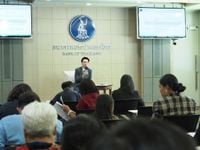On April 17, 2025, the Bank of Thailand (BOT) held a media briefing to discuss the preliminary impacts of global trade policies on the Thai economy. Mr. Sakkapop Panyaprateep, Senior Director of the Economics and Policy Department, outlined the significant effects of U.S. trade policies, particularly the tariffs imposed under former President Donald Trump, and how these measures will shape the economic landscape in Thailand.
Mr. Sakkapop emphasized that the ongoing trade issues, including retaliatory measures from major economies, will have substantial repercussions for Thailand's economic sectors. He noted that these impacts would manifest in various ways, particularly through financial markets and export activities. "The situation is expected to be prolonged, with clear effects taking time to materialize," he stated, highlighting the immediate volatility in financial markets as businesses await clearer guidance on trade policies.
According to Mr. Sakkapop, the financial market has seen increased fluctuations, with the Thai baht appreciating slightly against the U.S. dollar, by 2.71% as of 12:00 PM on April 17, compared to a 4.75% increase against the Japanese yen and a 3.11% increase against the South Korean won. These shifts are consistent with regional trends, influenced by a weakening U.S. dollar due to concerns about the U.S. economic outlook.
The Thai stock market has also experienced a decline, mirroring regional trends, while government bond yields have seen a slight uptick. Despite these fluctuations, there has been no significant abnormal trading activity among institutional investors, and the overall bond issuance market remains stable. However, Mr. Sakkapop cautioned that the situation requires close monitoring, especially regarding businesses affected by tariffs.
Exports, a critical channel for the Thai economy, are expected to be significantly impacted by the tariffs, particularly as the U.S. has postponed the implementation of reciprocal tariffs for 90 days. This delay means that clear effects may not be evident until the latter half of the year. Thai exports to the U.S. account for approximately 18% of total exports and contribute about 2.2% to the GDP, with sectors such as automotive parts, electronics, and processed foods facing the brunt of these tariff increases.
Moreover, Mr. Sakkapop outlined how Thai products will face intensified competition from other countries that export less to the U.S. This shift could lead to an influx of competing goods into markets previously dominated by Thai exports. He noted that the global economic slowdown could further exacerbate challenges for Thailand, as both exports and tourism revenues may decline due to reduced demand from trading partners.
In terms of investment, the uncertainty surrounding trade policies has caused businesses to delay decisions, particularly in sectors heavily reliant on U.S. markets. Mr. Sakkapop indicated that industries such as electronics, machinery, and automotive are particularly cautious, with many firms opting to wait for clearer signals before proceeding with new investments.
As the BOT continues to assess the situation, Mr. Sakkapop mentioned that the central bank will closely monitor trade transactions, production activities, and employment rates. Key indicators will include export and import transactions, temporary business closures, and financial stability risks. The BOT aims to ensure that market functioning remains normal and to mitigate any excessive volatility in the financial markets.
In a related development, the BOT has also compared the impact of tariffs on Thai exports to the U.S. before and after Trump's second term began. The analysis revealed that approximately 4,990 Thai SMEs export goods to the U.S., with about 4,800 of these businesses already feeling the effects of the increased tariffs. The BOT categorized the exposed sectors into three groups:
- Group 1: Sectoral Tariffs, including vehicles and parts, which previously had a tariff rate of 2.4% but have now increased to 25%, potentially reducing Thailand's GDP by 0.9%.
- Group 2: Reciprocal Tariffs, affecting machinery and agricultural products, which have seen an increase from 2.4% to 10%, with projected GDP impacts of 1.2%.
- Group 3: Sectoral Tariffs that have not yet increased, such as electronics, which account for 5.3% of total Thai exports, maintaining a 0% tariff.
As businesses navigate this complex landscape, industry leaders are urging the government to provide support measures, including financial assistance through the Exim Bank to help exporters manage increased operational costs. Mr. Kriangkrai Thiennukul, Chairman of the Federation of Thai Industries, indicated that the 90-day extension of tariff increases presents both opportunities and challenges for Thai manufacturers.
He noted that while the delay allows time for adjustments, uncertainty looms large as companies rush to fulfill existing orders before the new tariffs take effect. "This is a crucial period for Thai businesses to maximize their production capacity and secure orders," he stated.
As the clock ticks down on the tariff deadline, exporters are working diligently to ship goods to the U.S. to avoid the impending 10% tariff. Reports suggest that companies are expediting shipments to ensure that products arrive in time, with some firms needing to ship by mid-May to meet the deadline.
Despite the challenges, there remains optimism among certain sectors. Ms. Jareeporn Jarukornsakul, CEO of WHA Group, reported that many clients continue to express interest in investing in Thailand, particularly given the competitive tariff rates compared to other countries.
Overall, the BOT is committed to monitoring the evolving trade landscape closely. The central bank will continue to evaluate the economic impacts of tariffs and work to ensure that the Thai economy remains resilient amidst these global challenges. With strategic adjustments and proactive measures, Thailand aims to navigate this turbulent period while positioning itself for future growth.






